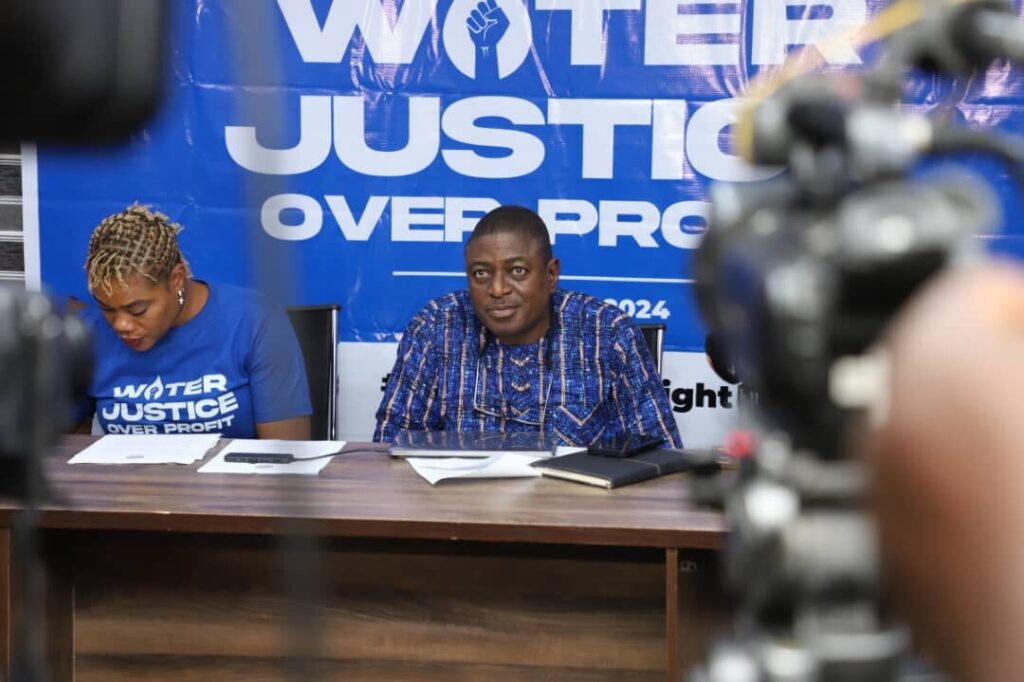It was 1 a.m. on a Monday morning from my office in Seattle when I logged onto my zoom account to join the kick-off press conference for the Africa Week of Action Against Water Privatization, an event hosted by our Lagos-based partners, Corporate Accountability and Public Participation Africa (CAPPA).
I could instantly tell that the room was buzzing, even from thousands of miles away. That’s because all of us—water activists from Lagos to Seattle to Dakar—were ready to expose and challenge an industry that profits from treating water as a commodity, rather than a fundamental human right.
Water justice over profit: Demanding access to safe water, free from the dangers of privatization
In its fourth consecutive year, the Africa Week of Action Against Water Privatization brings together people from across the continent to take action, build power, and uplift community demands for water justice. During the press conference, water activists painted the grim picture of water privatization. They talked about how these corporate water schemes have failed, again and again, to provide universal access to clean, affordable water, hurting low-income communities the most. And they urged governments to reject dangerous privatization schemes, including public-private partnerships (PPPs), pushed by corporations like Suez and Veolia.
Challenging the corporate control of water in deep partnership
For a decade, Corporate Accountability has partnered with CAPPA and organizations across the globe to stop the corporate control of water. Together, we’ve built a robust movement that has exposed the harmful impacts that water privatization has on communities.
In 2019, we began building on our success in stopping a World Bank-backed privatization threat in Lagos. (This win came after a two-year campaign that culminated in 2016 with the institution abandoning its efforts to secure a public-private partnership contract with the city). We formed partnerships with organizations from other African countries that have faced privatization schemes. And in 2021 we formalized this group into the Our Water Our Right Africa Coalition (OWORAC), a cross-continental network of water justice activists and labor organizers that regularly convene to strategize on how to rein in the private water industry in Africa.
During this week of action, activists in Cameroon, Ghana, Kenya, Nigeria, and Senegal took action in their local communities, and exposed corporate abuse in the media. And the coalition was not alone; allied organizations like the Institute of the Black World 21st Century expressed their solidarity in opposing dangerous water privatization schemes across the globe. It’s one more example of how OWORAC is building a corporate campaign with local, regional, and international potential.
Standing up to powerful bilateral agencies in Nigeria and beyond
OWORAC holds this week at the same time as the World Bank and International Monetary Fund annual meetings—two institutions that actively advance the agendas of the private water industry. For decades, these bilateral agencies have facilitated “partnerships ” between Global South nations and transnational water corporations, despite the well-documented failures of these ventures.
In Nigeria, international organizations such as the U.S. Agency for International Development (USAID), WaterAid, and the UK’s Foreign, Commonwealth, and Development Office (FCDO ) have promoted similar proposals that could pave the way for privatization. One privatization scheme was even linked to influencing water authorities in Lagos State to fire hundreds of unionized workers, a move that could make it easier to steer the megacity toward privatization. Throughout the week, CAPPA shined a light on these institutions, and made it clear to the state’s water management leaders that millions of people want Lagos’ water systems to remain in public hands.
CAPPA also organized and facilitated a water-focused community parliament in Lagos, where more than fifty local leaders across the state spoke directly with the Lagos Water Corporation (LWC) officials about their concerns about water quality and access. Across the region, communities are grappling with water scarcity, contamination, and the lack of access to public water. At the end of the session, LWC officials confirmed that they would take steps forward to improve the current conditions and committed to including community members in discussions on infrastructure improvements.
Exposing the deadly negligence of illegal mining on local water supply in Ghana
Our partners in Ghana at Revenue Mobilisation Africa, alongside a broader coalition of local organizations, exposed how mining operations are damaging and polluting the regions’ water supply. Activists briefed the press on the impacts of illegal mining activities, known as galamsey, on water: from exposure to noncommunicable diseases to loss of fish and wildlife and the destruction of people’s livelihoods. They also uplifted the community’s demands for economic reforms, environmental protection, and political accountability.
Water justice over profit: The power of collective action

Akinbode Oluwafemi, CAPPA’s executive director, addresses a crowd of press and activists. Photo credit: CAPPA
“It’s imperative that we examine how corporate greed impacts even our most fundamental rights and our most essential services,” said Akinbode Oluwafemi, the executive director of CAPPA, during the opening press conference.
Oluwafemi is right: corporate greed impacts our ability to access the resources that we all need to survive. That’s why we are proud to be in solidarity with organizers across the African continent and beyond who are challenging to these powerful water corporations and demanding justice in their communities. And your support through the Movement Solidarity Fund, which resources organizations that are dismantling corporate power and reclaiming people’s sovereignty around the world, is helping making this impact possible.
We will not let corporations profit off our need for safe, clean water and get away with it. By taking action together and supporting water justice from wherever we are, we can protect water as a public resource for all of us.


